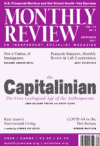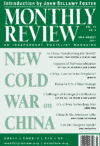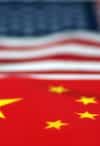Political Economy

In order to commit murder or mayhem under this program, vouchers must be submitted within one week prior to the actions contemplated or within a month afterward. Persons who commit violent acts without valid vouchers will be asked to enter into Voluntary Consent Agreements to desist from unauthorized murder or mayhem, and up to one tenth of any ill-gotten gains will be donated voluntarily to the charity of their choice, without any implication of admission of guilt. | more…

A new poem by Marge Piercy. | more…

In 2004, Washington launched a whole new strategy of financial war, based on the role of the U.S. dollar as the hegemonic foreign-exchange currency, to cut off the economic circulation of targeted states. The United States has created, as part of its “rules-based international order,” a coercive global framework extending U.S. financial jurisdiction to every country, economic entity, and person engaged at any point in U.S. dollar transactions anywhere in the world. | more…

Assuming that the Anthropocene will soon be officially designated as the earth’s current epoch, there remains the question of the geological age with which the Anthropocene begins. Adopting the standard nomenclature for the naming of geological ages, the term Capitalinian is proposed as the most appropriate name for the new geological age, conforming to the historical period that environmental historians see as commencing around 1950, in the wake of the Second World War, the rise of multinational corporations, and the unleashing of the process of decolonization and global development. | more…

The crux of Kate Soper’s Post-Growth Living is simple: we need to redefine “the good life.” We need to move away from a culture that equates the good life with endless consumption and toward one that equates it with experiences that are not defined by the market. Not only is this transition ecologically necessary, but it will also lead to fairer, and far more pleasurable, experiences. | more…

This special issue of Monthly Review is devoted to the New Cold War on China. What has been the view of the Chinese Revolution presented in Monthly Review in the past seven decades? How has it changed over time? As Paul A. Baran observed: “Marx and in particular Lenin being master-tacticians shifted horses and arguments as conditions changed (rightly so, to be sure!)” The question then becomes not the changing views themselves, but how these shifts in perspective reflect changing historical circumstances. | more…

The imperialist world system, crowned by U.S. hegemony, is now threatened by China’s seemingly inexorable rise and pursuit of its own distinctive sovereign project. In this respect, the Trump administration’s prosecution of a New Cold War on China was no anomaly, but rather the inevitable U.S. response to China’s rise and the end of Washington’s unipolar moment. The Biden administration has made it clear that it not only intends to continue the New Cold War, but to accelerate it. | more…

In most mainstream Western media, China is now presented as a threat, a conquering “empire.” Still the global hegemon, the United States is worried about the Chinese rise in strength, and their successive administrations are building the anxiety-provoking image of a China eager to supplant it and steal its leadership of the capitalist world system. | more…

Confronting the triple trap of the COVID-19 pandemic, economic downturn, and ecological crisis, the Chinese leadership has reiterated that “China puts the people’s interests first—nothing is more precious than people’s lives.” This kind of people-centered governance philosophy is ostensibly meant to protect the lives and health of the people, while defending people’s property under the basic system of collective ownership. | more…

Whether China has become an imperialist country is a question of crucial importance for the global class struggle. Although China has developed an exploitative relationship with South Asia, Africa, and other raw material exporters, on the whole, China continues to transfer a greater amount of surplus value to the core countries in the capitalist world system than it receives from the periphery. China is thus best described as a semi-peripheral country in the capitalist world system. | more…

U.S. fantasies of expansion, commercial dominion, and military prowess have long hinged on a premise of Pacific exceptionalism. Couched in the millenarian language of manifest destiny, the Pacific region and its multitudinous ecosystems, cultures, peoples, and nations have been vacated in favor of an aqua nullius that frames the region as an empty space designated for U.S. possession by divine providence. | more…

One of the key components of U.S.-China strategic competition is the technology war, the essence and implications of which can be further understood in the broader context of the international division of labor and the two countries’ internal contradictions. From this front, we can decipher the antagonism between different classes/groups within and across the two countries. | more…











